Photos by danielle c miles
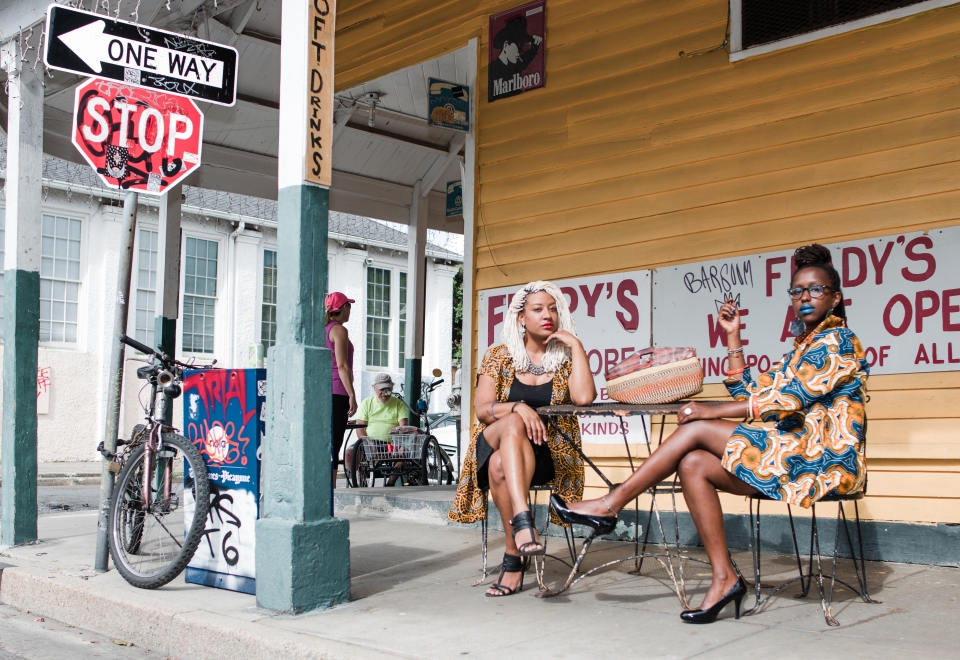 Post Soundtrack – “Little Girl Blue” – Nina Simone
Post Soundtrack – “Little Girl Blue” – Nina Simone
The Corner: Corners, neutral grounds, stoops, shade trees and corner stores have long been cornerstones in Black communities across the world. From the exchange of neighborhood gossip to political debates, dominos, chess games on legless tables balanced on the knees of the players, to the trading of goods and services beneath signs that scream “NO LOITERING!”– which is perceived as more of a request than a demand, cornerstores — these locations continue to provide space for gathering and communal expression of Blackness. “The Corner” is an ongoing photo-documentary project takes an intimate look at their confluence in the Black community.


DENISIO TRUITT:
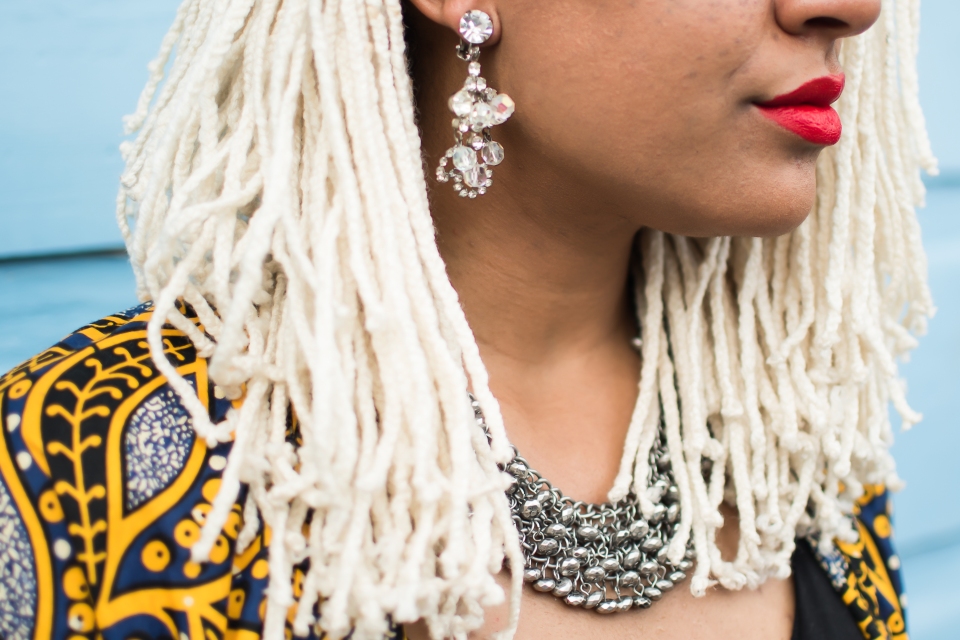
EARRINGS: were found in an antique store while thrifting with a friend in Philly. NECKLACE: is from H&M
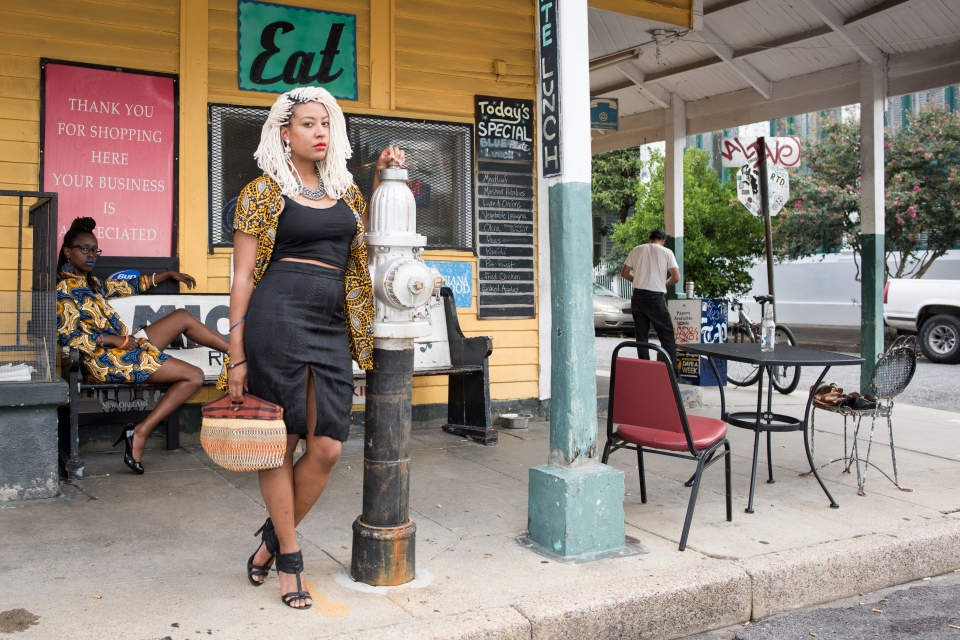
JACKET: was made by me. It was originally a shift dress I made with some Ivorian fabric but I reconstructed it for this shoot. SKIRT: is H&M. Was part of the Altuzarra for Target collection. My friend Blake and I waited for the Target in Metairie to open the day the collection debuted and we made out like bandits. I’m not one to hype these designer collections, but this is honestly my favorite skirt, shockingly thick girl friendly HANDBAG: is from Ghana SHOES: Are actually my friends and I’m embarrassed that I still have them and haven’t returned them 😦
DENISIO: (This story talks about depression and (lightly) self harm. Those who find those subjects triggering may want to sit this out) I’ve never really shied away from talking about my depression and anxiety. Even though I learned early on they were something to conceal, like the acne scars on my face and body, I also learned that trying to hide, suppress, or ignore them was fruitless. Like all my flaws, physical and otherwise, my depression and anxiety are a part of me. They have always been with me, a heaviness left over from childhood, inherited, and ancestral traumas. Even now as I type I can feel their weight. I carry them with me when I meet friends for lunch and to bed when my partner wraps a sleepy arm around my torso. These days they are almost completely manageable. Occasionally, I feel my muscles strain against their pressure and it feels like the foundation of bones are cracking from their heaviness.
For me depression and anxiety are two opera singers in an aria. My anxiety a shrill soprano, fluttery, quick, jerky sometimes so high pitched, it is silence. My depression is the contralto: deep, deliberate, slow, cloudy like chilled honey. They play off of one another sometimes in dangerous harmony. But mostly they are two distinct beings with the same crippling affect on my body.
Growing up I had no context culturally for depression or anxiety. Not on my Liberian side nor my Black American side. My disorders had no room in the rough-handed straight-backed African matriarchy that was my mothers family. To be “sad” or rendered to the point of hysteria from unseen forces means one of two things in the Liberian household: That you’ve either been around these “silly American kids” for too long or that Satan or a lesser demon has taken possession of your body and you need to pray it out. And while at times it felt as though my mind and body were on some whacked out auto-pilot, I hardly believed the devil would waste time possessing an eleven year old whose biggest crime was refusing to play outside with the other neighborhood children.
But even if my illness was simply a silly American thing, it certainly wasn’t a Black American thing. Popular culture and films taught me that mental illness was reserved for the privileged, the thin, and the very white. I can remember watching Girl Interrupted as a teen with a group of white friends (most of which had their own therapists saved in their cell phones and prescribed medications) and feeling no real connection to the characters because none of them looked like me or came from my kind of background. I can remember my friends weeping at the end while I was left with questions. Why were there not Black characters in the hospital? The movie was set in the late 60’s but the Civil Rights act was passed in 1964 and most hospitals and psychiatric institutions in the north had been desegregated long before then. What was my role in the story? The answer was obvious. I was the nurse, played by Whoopi Goldberg. I was the strong Black motherly figure, literally coddling and comforting the middle class W.A.S.P. girl who couldn’t stick it in a cushy mental institution paid for by her concerned but distant rich parents. Black women don’t get mental illnesses. We’re too strong for that. Even when we literally and figuratively can’t afford to be.
I tried to live with that lie for a few years. I smiled in public, made my friends laugh, pretended to be normal with the hopes that my brain would eventually get the memo. My mom was able to score a low cost prescription of a (then new) drug called Paxil and I convinced her it was working. I convinced myself that my inability to get out of bed and eat or drink for three consecutive days was just sadness. That the dragging of razor blades against my wrists and upper thighs was just stupid me trying to get attention. I kept believing that my blackness was some type of invincibility cloak… until the day I began to plan my suicide and scared myself into seeking help.
I created my own context for Black depression and anxiety by talking about living with them. I learned that many Black women in my social networks and even close friends were silently coping and at times suffering. I read about my disorders. I faced the harsh reality that depression and anxiety would be life long partners but that didn’t mean that I couldn’t have a happy and productive life. I treated them like diabetes or any other incurable ailment that could be managed. I tried (Western) medications with no real success so I focused on holistic techniques. I learned what foods to eat and what vitamins to take. What herbs calmed my nerves and what herbs could help with boosting my serotonin. I became aware of my anxiety triggers and avoided them when possible and confronted them when I felt safe to do so. I also learned a way to ease the specific anxiety surrounding social events which is where my love of clothing comes into play.
Somewhere in the middle of my 20’s I learned that sewing helped me with my anxiety. Something about the vibration of the machine, the monotony, the rhythm lulled my panicky racing mind. In these moments that sewing forces me to remain in the present, my attention in the task at hand and my brain is unable to do its favorite thing: create mental projections of a future where people laugh at me because I say the wrong thing, judge me, and ridicule me. I would learn from a therapist later that what I was doing is a version of a cognitive technique called grounding, used to help survivors of PTSD and anxiety disorders. To ease my fears of going to public events, I created a clothing ritual around it. I’d pick out an outfit and often times create something new or reconstruct an item to wear to that specific event. Like my ancestors did in their traditional masquerades and spiritual ceremonies, I created costumes and masks to invoke good “spirits” and ward off bad ones. Only these costumes and masks were in the form of patterned jackets, plunging wax print shift dresses, and fanciful hats.
My ritual costumes have dual purpose. They keep my mind busy before a stressful social situation and then make me feel confident during the event itself because I know that what I have on was made especially for me and my body. Something about that type of personal care and self love makes me feel so good, even when being in crowded places freaks me out. Clothing speaks for me when my mouth is unable to. I am able to be vibrant, bubbly, fun and playful even when my body feels less than. I learned that many times when I am feeling down, bright patterns and sequins makes me feel better. They are like security blankets for my brain.
My ancestral guide is my late grandmother, Prisicilla Enisio Sayeh. I was named after her and our name translated from Kru means “nothing lasts forever”. We are not only connected in name, she too loved to sew and even had her own boutique in Liberia. I dream about her often and in these dreams we talk about my own aspirations for a boutique and the art I’m making. She tells me the same thing every time, simply “Keep Going”.
In those times where I feel the familiar weight of my depression or the panicky flutter of anxiety, I remind myself of our collective name and I realize that this WILL pass, that this will not last forever.
And then I keep going.

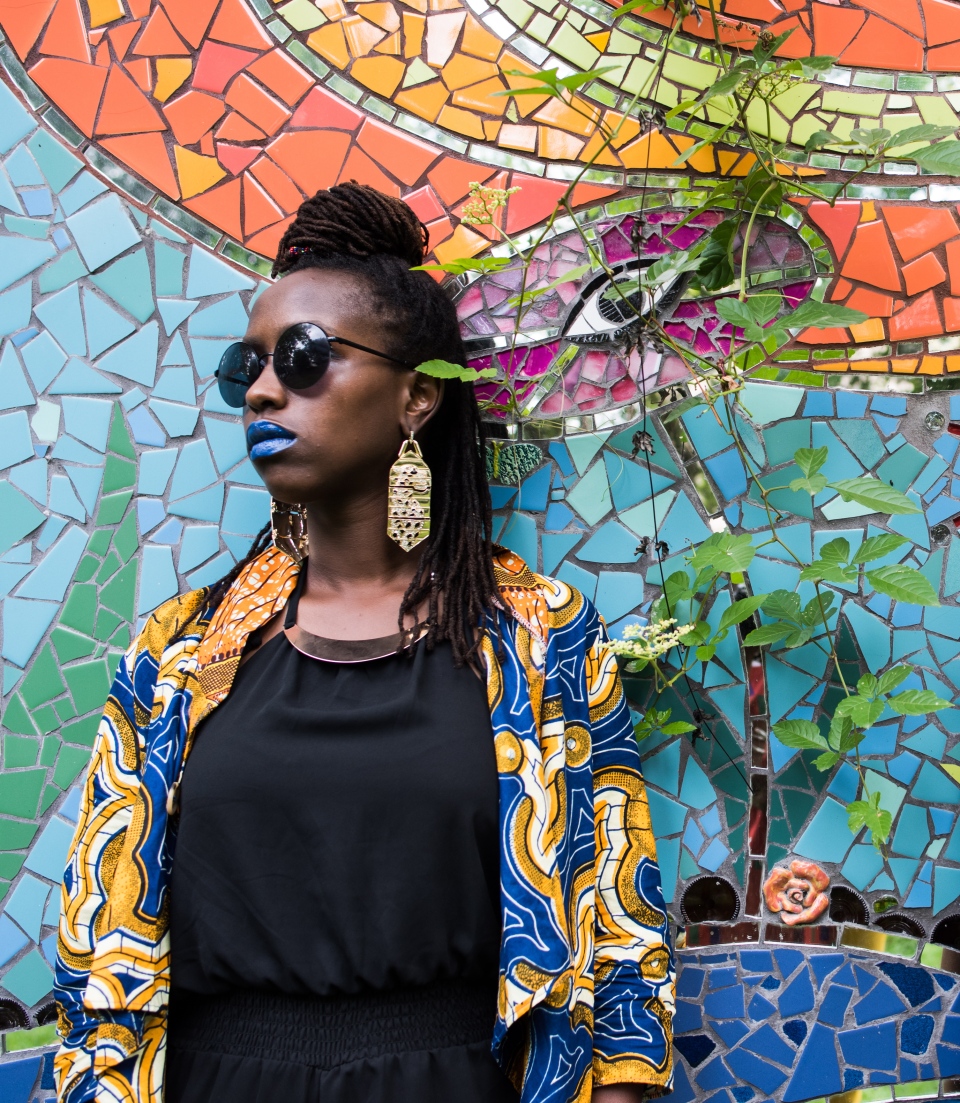
SUNGLASSES: OK so I may have been having a bad morning and shed a tear or 10 during the shoot so I had my friend Naima bring me her shades EARRINGS: My boss gave these to me too! What has your boss done for you lately??
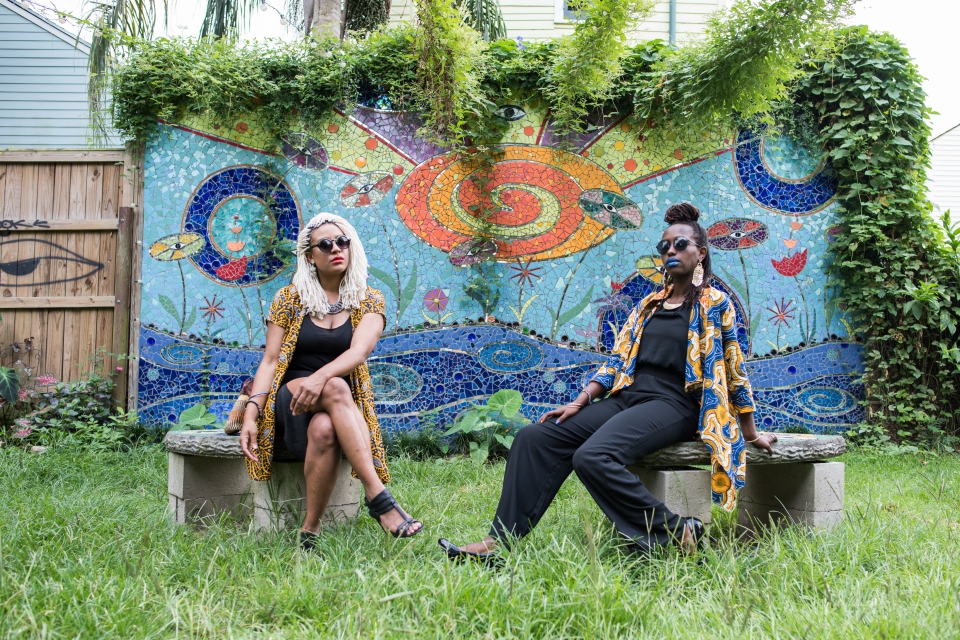
JUMPSUIT: Was a Christmas gift from my dad. Gift giving has come a long way in our family. We do Secret Santa with a price cap so you only get one present a year. Once I got …an Atlas… #DeprivedAfricanChildhoods JACKET: Was made for me by Aya Designs Global
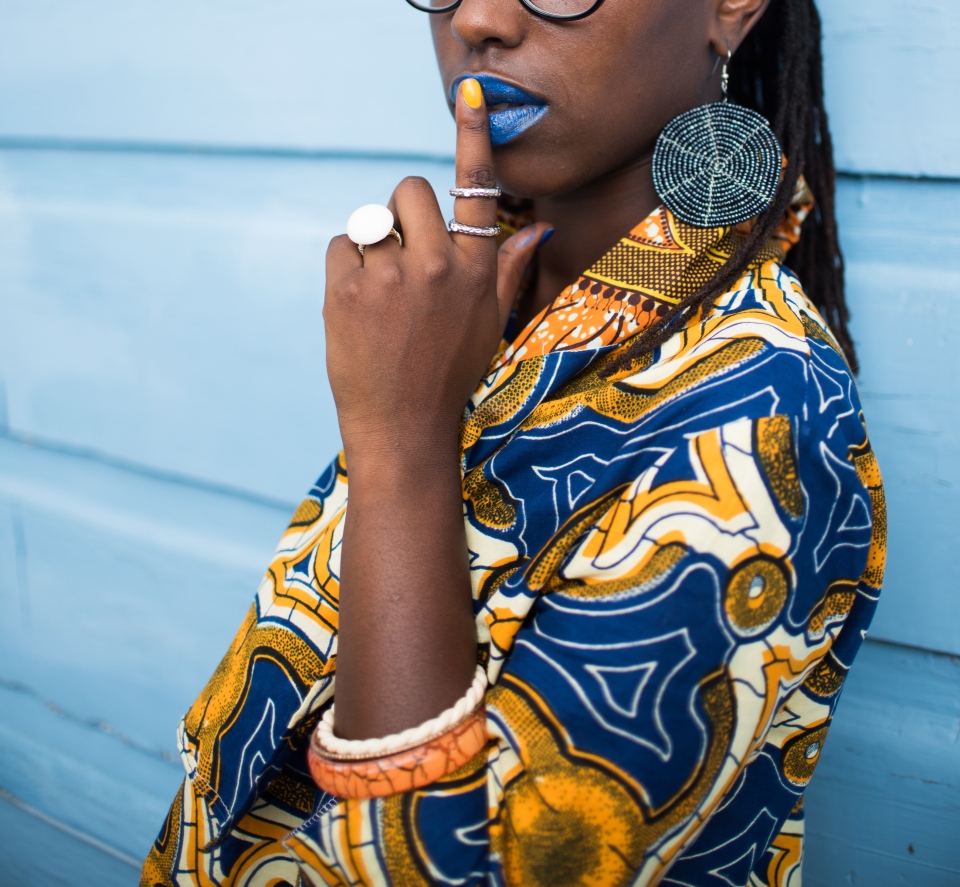
EARRINGS: From the Masaai Market in Kenya RING: Given to me by a Kenyan vendor at VooDoo Fest last year where I was working. He also gave me his free vendor tickets to the festival to give to my friends because he didn’t know anyone in town… shoutout to the continental hookup! BLUE LIPSTICK: Belongs to Denisio. I’m still getting into playing with lipstick and I’m stuck at red, purple and black. This look is a lot for me on the everyday level…I feel like I’d have to maintain this flyness all day and I’ve got like maximum 4 fly hours every 24 hours.
MWENDE: I wasn’t sure if I’d be able to finish writing this post. I started trying to write it last Tuesday, but each time I’ve sat to put words on the page, I find myself wrapped in my bed with tears in my eyes soon after. However, since deadlines real (even if you set them for yourself), and I’m already sitting in a bed crying, I’m just gonna go for it and see where it goes…
My name is Mwende “FreeQuency” Katwiwa. I am the last-born daughter of two life long educators who have given me parts of themselves that I am still I discovering everyday. I am a little sister who is allegedly a pain in the bum from time to time. I am a social justice oriented poet who values community voice more than individual advancement. I am an anti-racist, anti-capitalist Reproductive Justice organizer with BYP100 and with Women With A Vision, Inc. I am a young Black woman who has decided to be unapologetically young, unapologetically Black and unapologetically woman.
I am all of these things and more.
…Most of the more is my depression.
My depression is the hardest thing for me to be honest about because my whole life I’ve been told that Black women like me do not get depressed. We are supposed to be all strong and stereotype, a pandora’s box of other people’s problems. We are supposed to spend so much time caring for and carrying others that we forget that we too are this thing called human. It took a long time for me to admit that I was stitched together with sadness, mainly because no one wanted to see me as a somber seamstress. No one wanted to believe that the girl whose smile was known as the sun in people’s skies could be drowning in the tempest of herself. Because of their disbelief, I didn’t want to admit that I hadn’t seen the eye of my own storm in years and I was starting to erode beneath the hurricane of emotions swirling in my heavy spirit.
My depression hides in the gaps of my teeth when I give my sunshine smile. When I close my mouth I can taste it sitting like a grain of sand beneath my tongue. Something I know is there but I cannot seem to spit it out. My depression sits heavy in the bags underneath my eyes. Like it packed them full of itself with no plans of ever leaving. My depression is a glutton. It eats away at the meat on my bones until I am a skeleton of myself, literally and figuratively. My depression is Black. And woman. And Black woman. It does not have the luxury of being what I was told depression looked like and that is how it remains so much a part of me.
Depression is the Black sheep of the Black community, especially for Black Africans. There is still this notion that mental illness and emotional distress are not just ‘white’ but also ‘western’ and it has had devastating consequences on individuals and our families. Recently one of my cousins in the states committed suicide and it had a huge impact on the Kenyan community I was raised in because we/they could no longer deny the issues of mental health that were and had been present for some time. I was speaking to this cousins’ little brother about his death and we talked alot about how we all tend to knew peripherally that something is going on but its not until a crisis happens that people start to think to name what is going on. We talked about my other cousin who is now basically a vegetable after years of unaddressed mental health issues led to a massive drug dependency. We talked about how I left home when I had just turned 17 because I knew if I stayed I would end up like one of them. Unfortunately when I left, I realized that the whiteness of mental illness was all around me. It was reinforced by every space I visited to try and get right being chock full of (wealthy) white people and therapists who somehow could not understand the depths of my despair and were often dismissive as a result. It was hard because often I didn’t know where it was coming from so their dismissals felt justified. At some point, I got used to my depression being dismissed that I learned to live with it the way one learns to live with an ache in their knee, or reoccurring migraines – my depression is muffled suffering people pretend they are straining to listen to but only so they can put the sun back in their sky.
Last year, in the weeks before graduating from college, my depression broke down my dorm room door and sat itself in my ear. It became my translator and whispered the truth of my inadequacy in every word other’s spoke to me. It siphoned my joy and I became heavy with the weight of the emptiness left behind and I knew I was in a bad place. I remember saying to people in my life that I didn’t think I was going to graduate and no one took me seriously. I was only taking 3 classes because I had already completed about 98% of my graduation requirements. I was being notified every week about some award or distinction I had earned from nearly every department I was involved with on campus. I was supposed to be anything but depressed. I remember being on the phone with my dad one day and telling him in no uncertain terms that I was not in a place to finish school and him offhandedly saying that I’d be alright. I hung up soon after not knowing what to do but feeling like I was on the verge of a breakdown. He was one of so many people who had recently told me that I needed to make sure I was taking care of myself, then when I confided that I was not OK, couldn’t entertain the thought that I was asking for help. This happened so much, especially in the last two years, that I’ve found it easier to deal with my depression alone than trying to hand it over to people who wrap it in a pink ‘Don’t Worry!! You’re OK’ ribbon before tossing it back to me like a hot potato. These days I often just disappear from my friends and family until I finish processing, and re-emerge often to find no one has noticed my absence (well no one except my mom and I know she did the African family phone tree cuz random family members have been hitting me up recently just to ask if I’m feeling OK or want to talk which is baffling because when I was going through it in high school I swore they all thought I was the prodigal daughter no one was sure they wanted to come home).
Clothing has become an increasingly important way for me to manage my depression on a personal level. It allows me to have an external outlet for what’s happening internally that I often can’t, won’t or don’t get a chance to express. Sometimes, when I don’t feel like speaking, my clothes speak for me. On the days when I feel most like myself, when I’m probably laying outside somewhere smiling eating fruit and drinking some water* with friends, I can be found in some cut off jeans or loose fitting pants with a graphic tee. These are the days I give less than -27 fucks about what anyone thinks of me. The days I am enough for myself. The days I feel like I can challenge the world to accept me as I am and be OK with either rejection or acceptance.
When I am feeling vulnerable, or raw, or volatile I find myself dressing more masculine. Over the years I’ve seen how people treat me differently when I present as masculine, mostly in that they respect my personhood and leave me alone when I ask. It’s wild to me that I still have to use masculinity as a shield against the world but on the days I am raw it gives me a safety and comfort that I rarely feel when I present as femme.
When I am at my absolute saddest, I dress ‘like a Kamba’ as my parents like to joke (Kambas are known for wearing bright colors, especially yellow). The bold patterns are beautiful, but they are really meant to distract from the sadness that I’m afraid is seeping through my skin. The bright colors are striking, but they are more meant to divert your eyes from the dark circles under my own.
I’ve been dressing like this a lot lately.
WELP! This is getting really long and I’m not even past the surface yet…To be honest there was about 5 pages of text that I typed up and mashed down together for this post so it may come up again on the blog, but for now, I’m…just…
…gonna…
stop…..
…writing**
—————
*read: daiquiris
**shoutout to this blog for being this space where I can process some of these things in a semi-coherant way. Both Denisio and I have been showing up to shoots recently feeling a bit down and/or looking red eyed and puffy faced from waking up crying/crying on the way to meet the photographer, but there’s something about Black women gathering and holding each other’s space that has us leaving every shoot looking like this:

Noirlinians is a love story by two wandering Daughters of the African diaspora
Follow us on Instagram & Twitter: @Noirlinians
Like Us on Facebook

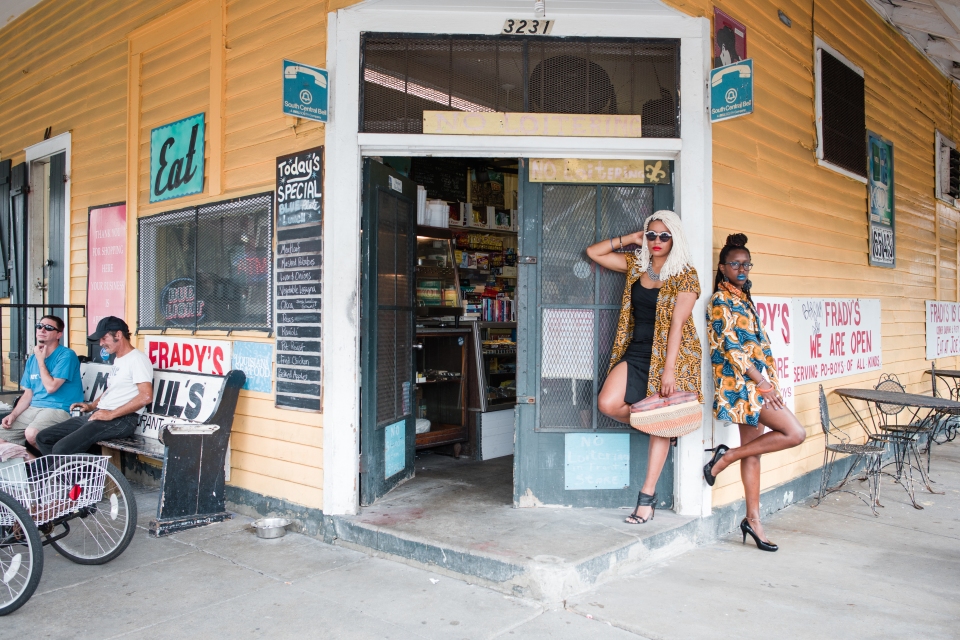
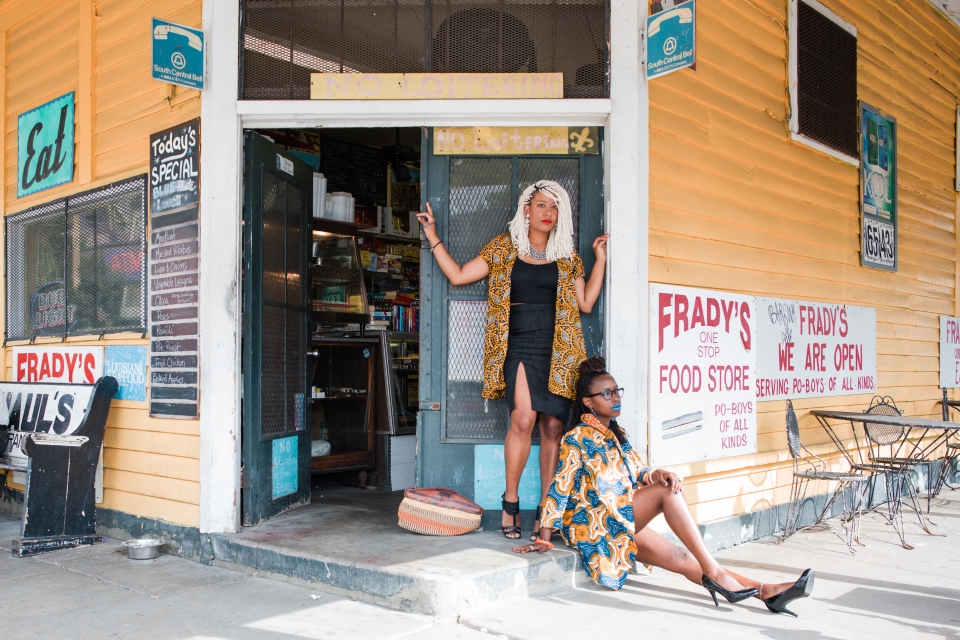
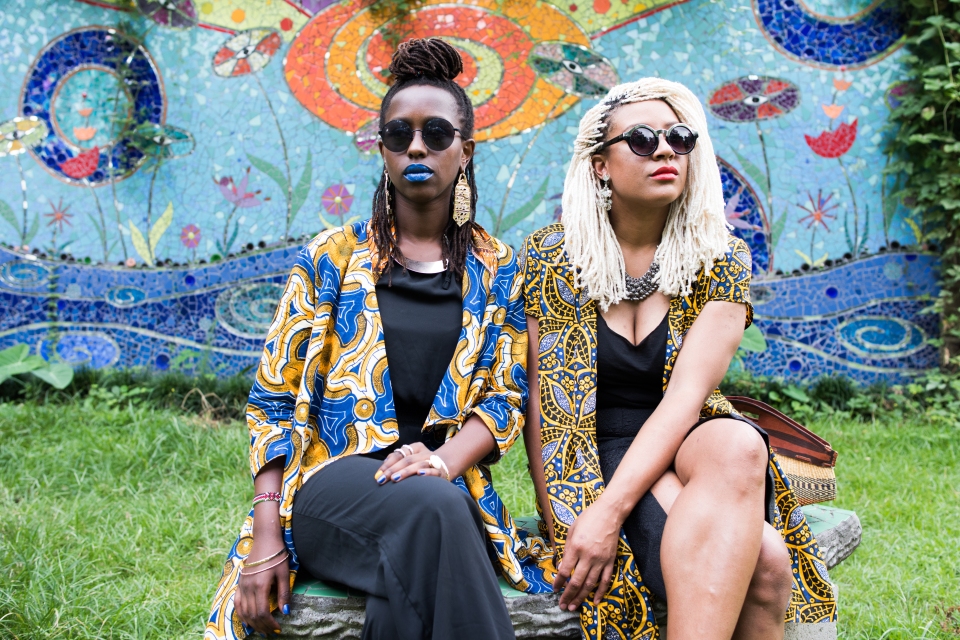
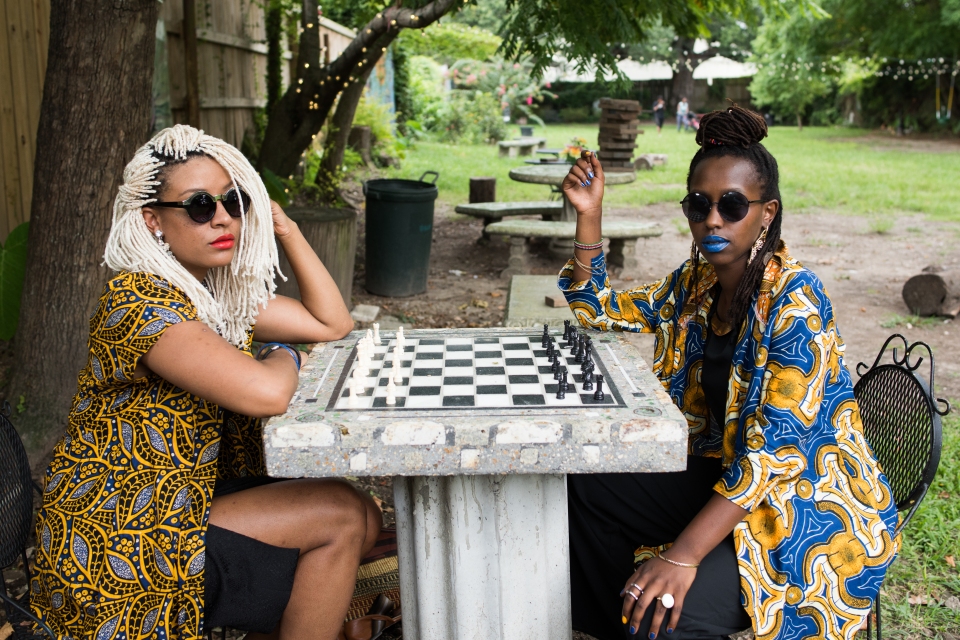
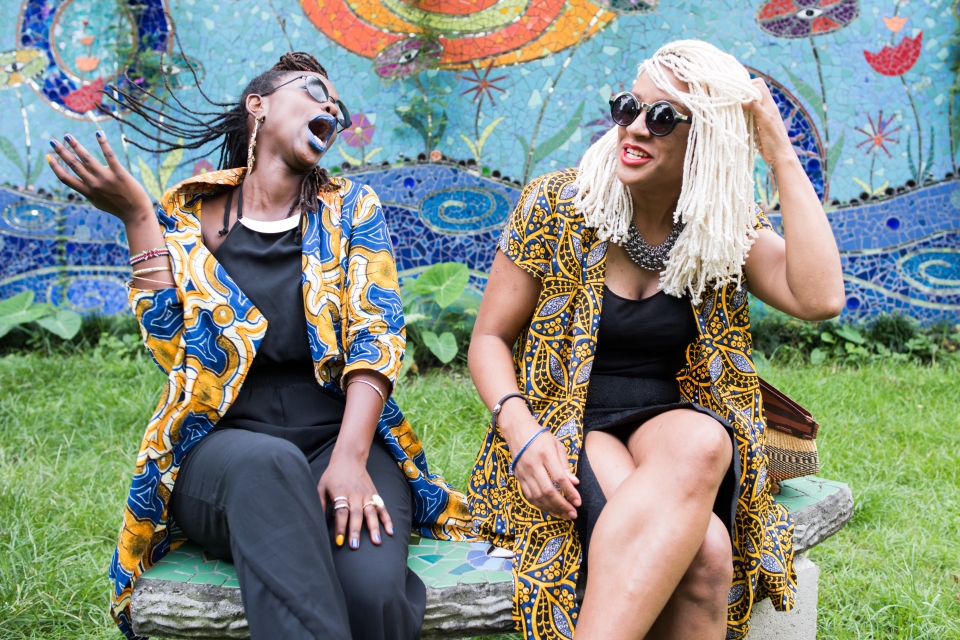
Thank y’all for opening yourselves and sharing about depression. And, as always, thanks for sharing the beauty of clothing and the beauty of my city.
LikeLiked by 1 person
That’s HOT! right up the street from my stopping grounds #RiteOn
LikeLike